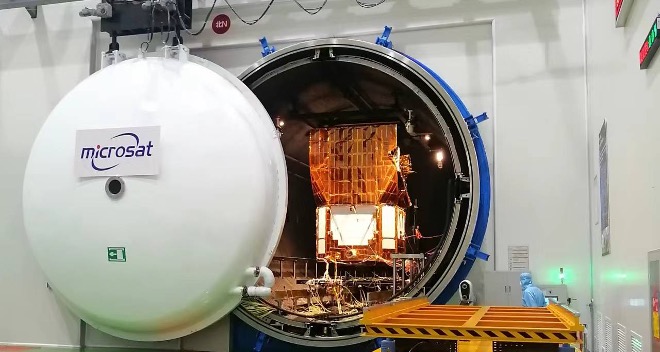EP Satellite Successfully Passed the Thermal Test in August 2023
From July 20 to August 8, 2023, the Einstein Probe (EP) satellite successfully passed the thermal test in the Innovation Academy for Microsatellites, CAS.
Thermal test aims to make sure the satellite can work normally once launched, despite the harsh environments in space. For this sake, the whole-satellite platform has to be test in different simulated extreme conditions in lab before launching. Such tests include three parts: low pressure discharging test, thermal balance test, and thermal vacuum test.

Figure 1 EP Satellite in KM4C Vacuum Chamber
The thermal test results showed that the EP satellite can perform normally to achieve a working performance up to the preset standards in a low-pressure environment. The thermal control system of the satellite was demonstrated to be capable of maintaining the onboard instruments within the working temperature range under different external heat flux environments, indicating a correct and reasonable thermal control design. The instrument of the satellite operated normally under vacuum and extreme temperature conditions, and the performance indicators met the requirements. The temperature difference and temperature stability indicators of key components such as the payload support truss, Wide-field X-ray Telescope (WXT) and Follow-up X-ray Telescope (FXT) supporting frames, star tracker supporting frame, WXT CMOS detector, and FXT pnCCD detector all exceeded the requirements.
During the thermal test, the WXT and FXT of the EP satellite underwent a series of testing. Tests including long-term detector background test, trigger and follow-up test via hot spots, software refactoring test, and data stress test were conducted on WXT payload. All 12 WXT modules performed well during the thermal test. Tests including the sunshield flip structure opening test, full-frame, windowed, and time-variable operation mode tests, wheel full blocking and radiation source positioning tests, background data acquisition test, offset calculation test, and front-to-back light leakage test were carried out on the FXT payload. The FXT payload worked well in various working modes during the thermal test.
Currently, the EP satellite mission team is intensively conducting follow-up tests for the flight model of the satellite, with a plan to launch in December 2023 at the Xichang Satellite Launch Center.
Provided by IAM, CAS